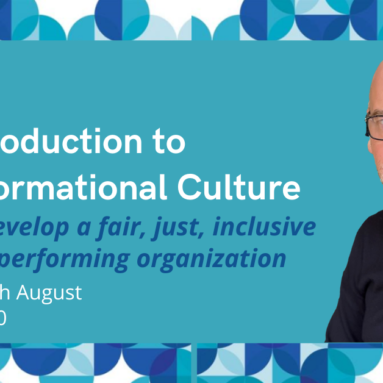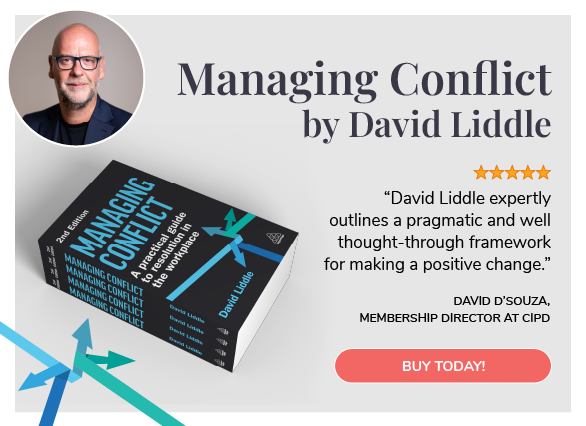
Share article:
Tags:
“The next time I encounter yet another excuse for not addressing racism, injustice or fairness by an employer, I will whip out David Liddle’s Transformational Culture. I DARE every leader, manager, lawyer and HR person to read this book. He transforms outdated, rigid and harmful disciplinary processes based on retributive justice towards what this world needs: restorative justice: focused on learning and collective organisational safety.” – Aminah Kosai, Founder of Speak Up Collective and Counsel
Our CEO & Founder, David Liddle, is launching his second book titled Transformational Culture on 3rd September 2021. To celebrate, David hosted a widely anticipated Introduction to Transformational Culture webinar to many avid listeners. We were guided through the steps to achieving a fair, inclusive, sustainable, and high performing organisation. More than anything, it was a call to action for significant change within workplace cultures.
It goes without saying that workplaces have seen a rise in conflict, disengagement, and hostility. Toxic atmospheres permeate employee wellbeing, directly affecting business turnover, productivity, and staff retention. For David Liddle, the answer lies in a cultural shift. His life’s work in alternative dispute resolution led David to see the intersection between conflict management and culture, and how we can utilise this bond to make the world a better place for all.
Draconian Discipline
“Behind every conflict is a damaged person and a damaged relationship.”-David Liddle
If it’s broken, you need to fix it. And here at The TCM Group, we have 20 years of success targeting and resolving issues within fragmented relationships. We understand that traditional grievance procedures are focused on blame, shame, and punish. Formal litigation is reactive and reductive, conforming to a “one size fits all” approach which is untenable in a modern, diverse, and increasingly flexible workplace. Parties are polarised, causing issues to become entrenched, ignoring business and individual needs, and impeding creativity and growth. These pejorative outcomes merge to perpetuate negative and toxic cultures, upholding an “entitlement culture” that does not serve the best interests of anyone except those at the very top.
We need to start putting people first – by choosing a business model that values rather than combats our employees, centring on resolution not confrontation.
Custodians of Culture
“It is no longer tenable for HR to seek to sit at the ‘top table’ while disregarding the harmful and divisive impact that its policies, processes and procedures is having across the workforce. A transformational culture offers a more balanced and nuanced model of HR, a culture which puts the human back into the profession and where HR is driven by a focus on, and a passion for, people and culture.”-Transformational Culture
But how do we integrate these values into our organisations on a structural level?
The Transformational Culture Model
In David’s Transformational Culture model, HR functions cease to exist as a “business partner” of management, instead holding leadership to account as an independent, objective, and strategic arm of organisations. This cultural evolution, focusing on restorative rather than retributive justice, centres on three main pillars of organisational structure:
- Transformational Leadership: role modelling behaviours, visionary, trustworthy
- Transformational HR: values-led, strategic, focused on empowerment
- Transformational Justice: fair, just, restorative
When implementing this new business system, organisations must identify their core values and purposes and integrate them into every single process, system, and mechanism of their organisation. David urges businesses to use behavioural science and positive psychology to drive change for teams and departments, giving dialogue and empathy primacy in psychologically safe spaces.
David defines these seven core competencies as:
- Collaboration
- Courage
- Common purpose
- Communication
- Compassion
- Curiosity
- Connection
Within this model, David developed a Resolution Framework for businesses to embed into their systems. It provides the tools and guidelines for handling grievance issues, reflecting a values-based, outcomes-oriented, person-centred transformational culture. The framework involves:
- Adult to adult dialogue.
- An enhanced triage assessment of cases using a Resolution Index.
- The use of early resolution, facilitated conversations, restorative justice, and mediation.
- Complete compliance with the Acas code, employment and equality legislation, and best practice guidance.
This framework has been adopted by a multitude of national and international corporations, paving the way for a total cultural shift in all workplaces.
Design, Deploy, Evaluate
So, we’ve been introduced to values, behaviours, and aligned systems. How will David’s culture model actually be implemented? There are three distinct phases to the process, tailored specifically for the unique needs of organisations.
Phase 1: Design
- Undertake the Transformational Culture Index
- 1x stakeholder engagement event
- Transformational Culture business case and project plan (including ROI measures)
- Presentation at board
Phase 2: Deploy
- Transformational Culture Hub development and training
- Values and behaviour framework development
- Resolution Framework development
- People and culture strategy development
Phase 3: Evaluate
- ROI measures and evaluation over 12 months
We’re here to support you all the way, from theory to practice and beyond.
David’s webinar provided an invaluable insight into the blueprint for a better world, focusing on people, policies, and positivity. The time is now to be a part of the movement.
“The understanding offered by this powerful analysis of organisational culture offers a clear route to transforming work organisations for the future so that those who work in them thrive, the lives of the people they serve are enhanced and the planet they are part of is protected.”-Professor Michael West CBE
If you missed out on David’s webinar session, you can catch up via the below recording:








